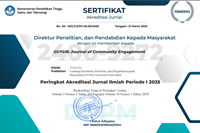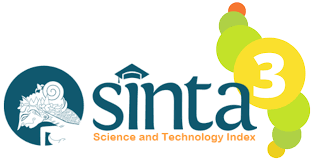Afandi, A., Laily, N., Wahyudi, N., Umam, M. H., Kambau, R. A., Rahman, S. A., Sudirman, M., Jamilah, Kadir, N. A., Junaid, S., Nur, S., Parmitasari, R. D. A., Nurdiyanah, Wahid, M., & Wahyudi, J. (2022). Metodologi Pengabdian Masyarakat (Suwendi, A. Basir, & J. Wahyudi (ed.)). Direktorat Pendidikan Tinggi Islam,Ditjen Pendidikan Islam, Kementerian Agama RI.
Angelina, P. R., Nurihsan, J., Suherman, U., & Yustiana, Y. R. (2024). Pendampingan Peningkatan Akuntabilitas Guru Bimbingan dan Konseling di Kota Bogor. GUYUB: Journal of Community Engagement, 5(2), 480–498. https://doi.org/10.33650/guyub.v5i2.8599
Baeti, S. (2022). Pembelajaran Abad ke-21 dan Persiapan Guru Merancang Ulang Desain Pembelajaran. Kemenag RI - BKD Jakarta. https://bdkjakarta.kemenag.go.id/pembelajaran-abad-ke-21-dan-persiapan-guru-merancang-ulang-desain-pembelajaran/
Bronfenbrenner, U. (1979). The Ecology of Human Development: Experiments by Nature and Design. Harvard University Press.
Budiwiranto, B. (2019). Modernization and Pesantren Based Community Development in Indonesia. JAWI, 2(1), 1–18. https://doi.org/http://dx.doi.org/10.24042/jw.v2i1.5885
Damanik, M. H., Hairani, A., & Antika, D. (2025). Peran Guru Madrasah Ibtidaiyah Sebagai Agen Pembelajaran Literasi Humanis. Edu Society: Jurnal Pendidikan, Ilmu Sosial, dan Pengabdian Kepada Masyarakat, 5(1), 121–129. https://doi.org/https://doi.org/10.56832/edu.v5i1.756
Datnow, A. (2020). The role of teachers in educational reform: A 20-year perspective. Journal of Educational Change, 21(3), 431–441. https://doi.org/10.1007/s10833-020-09372-5
Fachrurrazi, M., Fitri, S., & Hidayat, D. R. (2023). Bimbingan dan konseling di pesantren berlandaskan nilai religiusitas: kajian teori dan pola dasar. Jurnal EDUCATIO: Jurnal Pendidikan Indonesia, 9(1), 596. https://doi.org/10.29210/1202322996
Firdausi, L., & Sulistyorini, S. (2023). Membangun Kerjasama Tim di Lembaga Pendidikan pada Era Revolusi 4.0. Jurnal Manajemen Pendidikan Islam (MANAPI), 2(1), 21. https://doi.org/10.31958/manapi.v2i1.8239
Hakim, N., & Al Farabi, M. N. Z. (2025). Madrasah Movement with Character: Optimizing the Implementation of P5RA Values through MI Teacher Mentoring. GUYUB: Journal of Community Engagement, 6(2), 393–414. https://doi.org/10.33650/guyub.v6i2.11129
Hefner, R. W. (2019). Making Modern Muslims: The Politics of Islamic Education in Southeast Asia. University of Hawaii Press.
Kibtiyah, A., Gunadi, I., & Umam, K. (2024). Kesehatan Mental dan Prestasi Belajar Siswa Sekolah Dasar. Al-Adawat : Jurnal Pendidikan Guru Madrasah Ibtidaiyah, 2(01), 12–22.
https://doi.org/10.33752/aldawat.v2i01.3723
Mus, S., & Rusmayadi, R. (2019). Analisis data penelitian eksperimen model pembelajaran. Seminar Nasional Pengabdian Kepada Masyarakat Universitas Negeri Makassar, 87–88. http://103.76.50.195/semnaslpm/article/view/10896%0Ahttp://103.76.50.195/semnaslpm/article/viewFile/10896/6389
OECD. (2024). Education at a Glance 2024. OECD. https://doi.org/10.1787/c00cad36-en
Palieraki, S., & Koutrouba, K. (2021). Differentiated Instruction in Information and Communications Technology Teaching and Effective Learning in Primary Education. European Journal of Educational Research, volume-10-(volume-10-issue-3-july-2021), 1487–1504. https://doi.org/10.12973/eu-jer.10.3.1487
Poniman, F. (2018). Pancarona. Yayasan STIFIn.
Poniman, F., & Amalia, N. (2020). A Grand Theory of STIFIn Personality: Basic Function Theory Revise. International Journal of Psychosocial Rehabilitation, 710–715. https://doi.org/10.37200/IJPR/V2415/PR201737
Putri, R. A., Hartini, S., Agungbudiprabowo, A., & Siswanti, R. (2022). Peran Guru Bimbingan dan Konseling dalam Meningkatkan Motivasi Belajar pada Siswa Kelas X KKO di SMA Negeri 1 Sewon. Ideguru: Jurnal Karya Ilmiah Guru, 7(3), 281–287. https://doi.org/10.51169/ideguru.v7i3.398
Rachmawati, D. E., & Purwandari, E. (2022). Proses Ta’dib sebagai penguatan aplikasi pendidikan Islam di Indonesia: Pendekatan Systematic Literature Review. Tawazun: Jurnal Pendidikan Islam, 15(2), 175–186. https://doi.org/10.32832/tawazun.v15i2.7272
Rahmawati, M., Burhanuddin, & Zulkarnain, W. (2024). TINGKAT PENGUASAAN KOMPETENSI PEDAGOGIK GURU DAN PENGARUHNYA TERHADAP PARTISIPASI PESERTA DIDIK DALAM PEMBELAJARAN DI SMPN KOTA MOJOKERTO. Jurnal Pembelajaran, Bimbingan, dan Pengelolaan Pendidikan, 4(11), 10. https://doi.org/10.17977/um065.v4.i11.2024.10
Rizal, S. S., Roibin, R., Pkm, S., Literasi, P., Numerasi, D., Kampus, P., Angkatan, M., Kalibuntu, S. D., Probolinggo, V., Pkm, A. Z., Literasi, P., Dan, N., Teknologi, A., Program, M., Mengajar, K., Negeri, S., Satu, P.,
Noer, A. M., Hidayat, F., & Fawaid, A. (2023). Legal Counseling about the Dangers of Drugs for the Youth Generation. GUYUB Journal of Community Engagement, 4(1), 1–15. https://doi.org/https://doi.org/10.33650/guyub.v4i1.5902
Rosdianawati, A., Rusli, R., Mashuri, S., & Nadirah, S. (2022). Manajemen Pengembangan Tenaga Pendidik di Pondok Pesantren Modern Al-Istiqamah Ngatabaru, Sulawesi Tengah. Jurnal Integrasi Manajemen Pendidikan, 1(2), 26–36. https://doi.org/10.24239/jimpe.v1i2.1218
Saefiana, S., Sukmawati, F. D., Rahmawati, R., Rusnady, D. A. M., Sukatin, S., & Syaifuddin, S. (2022). Teori Pembelajaran dan Perbedaan Gaya Belajar. Mahaguru: Jurnal Pendidikan Guru Sekolah Dasar , 3(1), 150–158. https://doi.org/10.33487/mgr.v3i1.3976
Sekerci, H., & Yilmaz, F. (2021). The Role of Respectful Behaviour in the Relationship between Empathetic Tendencies and Conflict Resolution in Primary School Students. Eurasian Journal of Educational Research, 21(93), 73–94. https://doi.org/10.14689/ejer.2021.93.4
Tomlinson, C. A. (2014). The Differentiated Classroom: Responding to the Needs of All Learners (2nd Editio). ASCD.
Widiyati, E., Kibtiyah, A., & Bahrodin, A. (2024). Teacher Accompaniment in Improving Digital Literacy Through Metamorphosis Props Training QR-Code. Soeropati: Journal of Community Service, 6(2), 183–198. https://doi.org/10.35891/js.v6i2.4949
Widyadharma, A. P., Ulfatin, N., Utaya, S., & Supriyanto, A. (2020). Situational leadership with the STIFIn genetic intelligence approach. Systematic Reviews in Pharmacy, 11(6), 1409–1419. https://doi.org/10.31838/srp.2020.6.202

 (Universitas Hasyim Asy'ari Tebuireng Jombang)
(Universitas Hasyim Asy'ari Tebuireng Jombang) 









.png)

